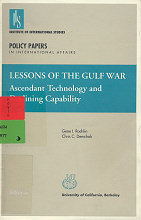
ROCHLIN – DEMCHAK : Lessons of the Gulf War (előszó)
PREFACE: TARIQ AZIZ AND THE HIGH-TECH AMERICAN CAMELS
The gulf war was the first space war. . . . It was the first war of the space age.
—Air Force Chief of Staff Merrill A. McPeak
In January 1990, Iraqi Foreign Minister Tariq Aziz was in Washington, where he told American Secretary of State James Baker,
Your affiance will crumble and you will be left lost in the desert. You don't know the desert because you have never ridden on a horse or a camel.
The quote points to the enormous gap between the rhetoric of the Iraqi leadership and the reality of Iraq's military power and capabilities. Whatever the assumed quality or experience of Iraq's military forces, they were never put to good use against the allied coalition in either the air or ground wars.
The Iraqi leadership seems to have been caught up in a romantic fantasy, and a Western one at that, more appropriate to Lawrence of Arabia than to the illustrious military forebears of Mesopotamian and Muslim culture. If, as the quote suggests, the Iraqi leaders did delude themselves as to the special benefits they would reap from an opponent fighting in their desert homeland, if they did truly believe that the United States had little will and no stomach for fighting, a great deal of the massive defeat they suffered may be attributed purely to delusion, and to a terrible misunderstanding of the American politico-military power and determination. An objective and informed analyst would have noted that U.S. forces routinely train in the desert and for desert warfare; that the flat terrain and relatively clear skies of Iraq conveyed tremendous advantage to the force most capable of exploiting surveillance and rapid movement; that the U.S. military had clearly shown its desire, even eagerness, to remove the tarnish of Vietnam.
The United States also has the potential to get caught up in self-delusion:
The videotape of [the] initial [air] attack, replayed endlessly over those first euphoric days, is the image that most Americans will remember from this war. . . . At long last, a successor has emerged to the mushroom cloud as the emblem of America's military prowess, and good riddance.
The complementary image to that of the Iraqis comes from the conclusions drawn from the combat experience in the Gulf. The first misperception is that the allied victory was primarily due to the performance of U.S. high-technology weapons systems. The second is that continuing the trend toward a high-tech military using primarily "smart" weapons will allow the United States to fight and win with minimal U.S. casualties. Tomahawk missiles cruising the skies of Baghdad looking for their targets and Patriot missiles rushing skyward in a great plume of fire and smoke to hunt incoming Scuds provide the drama of which televised news coverage, and future military romances, are made. A heroic technologically bound notion of prowess is now most likely to guide future American military force structure decisions.
We argue in this paper that this focus on the technology of individual weapons or specific systems is misleading. The weapons themselves are only the fighting tip of an extensive modern force structure; neither technological promoters of modern systems nor those such as Tariq Aziz who discount their importance fully appreciate either the capabilities or the vulnerabilities of an integrated organizational-technical military system. The U.S. victory was assured by the unprecedented degree of support the coalition was able to provide to the complex web of military and industrial organizations that supported the new technologies. Iraq was never able to successfully interfere with or disrupt this organization. However, a closer analysis shows that organizational requirements also constituted the main point of vulnerability for the coalition.
It is therefore the organizational support systems, not the technologies themselves, that deserve the most careful scrutiny. We adopt this perspective not only to assess U.S. performance in the Gulf, but also to use the experience to discuss the structure and vulnerabilities of a system of socio-technical military organization that seems increasingly to drive, rather than respond to, future military force postures and options.